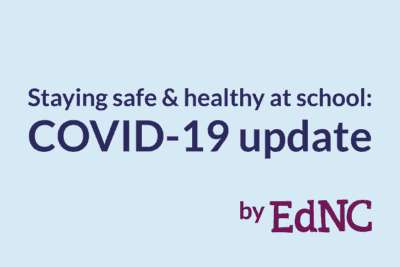
The Innovation Project (TIP) brings together forward-thinking North Carolina school district superintendents to find and implement innovative and transformative practices in public education so that students and their communities can thrive.
Here is a glimpse of how TIP districts are approaching issues related to COVID-19 as well as some examples from schools outside of North Carolina and other organizations.
Communication approaches
In addition to website updates and related documents, Rockingham County Schools provides its Emergency Response Plan in slides. Vance County Schools provides a video update by Dr. Tony Jackson, superintendent. Rowan County Schools provides a letter from Dr. Lynn Moody, superintendent, that relates the approach to emergency plans to their innovative work (scroll to bottom of the RSS home page). Gaston County Schools provides information on a county hotline and other county resources.
Many districts are adding frequent updates, but it may present a challenge for readers to know what is accurate from earlier updates. Wayne County Schools‘ updates begin with a statement that “This statement supersedes all previous communication to the public or staff. Please note that this information is accurate as of March 17, 2020 (5:30 PM).”
Local board action
Craven County Schools’ homepage features a notice of an emergency board meeting on March 18 at 9:00 a.m. to review and possibly take action on issues related to the coronavirus. Cumberland County Schools shares an announcement of the board passing a resolution that gives the superintendent emergency powers.
Remote learning plans
The following TIP Districts give examples of various approaches to remote learning plans:
Cabarrus County Schools, Extended Home Learning
Chapel Hill Carrboro City Schools, Extended Learning Parent Letter
Edgecombe County Schools, Instructional Continuity Parent and Student Resources
Elizabeth City/Pasquotank Schools, Classroom to the Cloud
Hoke County Schools, Remote Learning Hub
Mt. Airy City Schools, Remote Learning Plan
Outside of North Carolina, here are examples of approaches:
Chicago Public Schools, Enrichment resources – grade level packets
NY City Schools, Learn at home
Treddyfrin/Eastown School District, PA., Learning guide, attendance, equipment, specific protocols, etc)
Devices and connectivity
Moore County Schools provides a detailed Technology Support for Remote Learning (including how to check out hotspots and other options for internet access).
Vance County Schools highlights on its homepage the Spectrum offer for free internet service.
Douglas County Schools (Colorado) uses a Parent Technology Survey to determine needs during the school closure.
Chapel Hill-Carrboro City Schools provides information on how to disinfect your device.
School districts in California can also offer televised programming through the California Partnership with PBS. Los Angeles Public Schools identified it as one of their available resources.
Resources for parents
Parents need significant support as they take on the role of being facilitators of their children’s learning. As the hub of the community, a school district can be the key resource for parents as they take on this role. You could choose in your communication to make clear that you are extending these resources to all parents in your community. Many of the resources below are broadly applicable.
Massenfield Children’s Hospital (New York) provides a Parent Guide (specific to COVID-19). There are several articles that draw on the experiences from the homeschool community: CNN’s “How ‘regular school’ parents can homeschool their kids” and their companion article, “Parenting through the corona virus lockdown.” EdWeek shares a blog, “Teaching Kids at Home during Coronavirus: Protips from Homeschoolers.”
Granville County Schools has experience in helping parents become coaches/facilitators. At the Granville Academy (K-12), students learn through a combination of educational opportunities at school and at home. In order to make sure a curriculum is consistently followed, the school provides detailed weekly plans that are sent to parents. Attached to this email are examples of these plans.
Many TIP districts identify resources for parents. For an out of state example, see Jericho School District’s (New York) list of resources for parents.
Food distribution and food insecurity
TIP districts are taking different approaches to addressing providing food during school closure. The following are examples:
Asheboro City Schools provides breakfast and lunch – and possibly books – at the regular bus stops. Wake County Public Schools provides food distribution at schools and community centers. WCPSS also provides information on volunteering and related community efforts. Chapel Hill-Carrboro City Schools is distributing free lunches and snacks at various community locations, including apartment complexes. Warren County Schools requested a google survey from parents to identify needs in order to to solve transportation problems in getting to food distribution locations.
If you know of other innovative approaches districts are taking, please email Mebane at mrash@ednc.org.
Recommended reading

